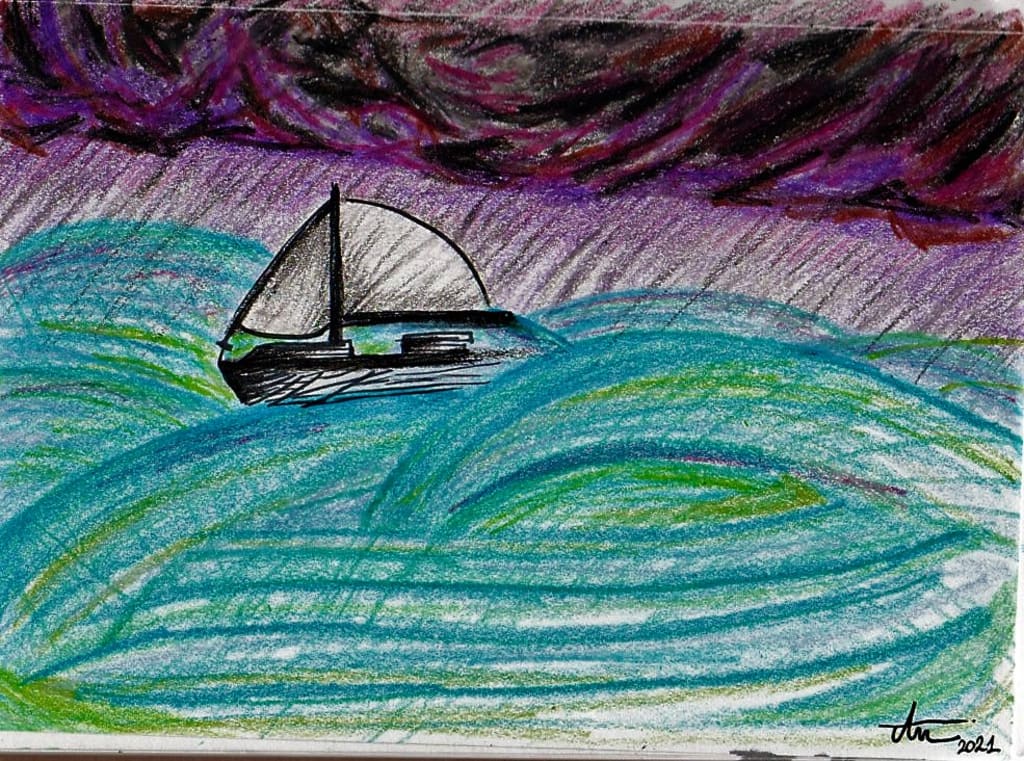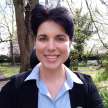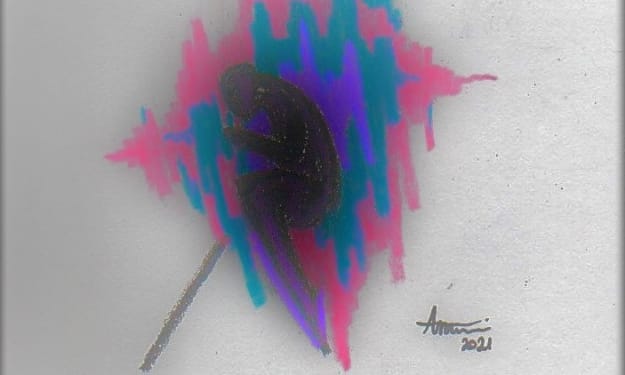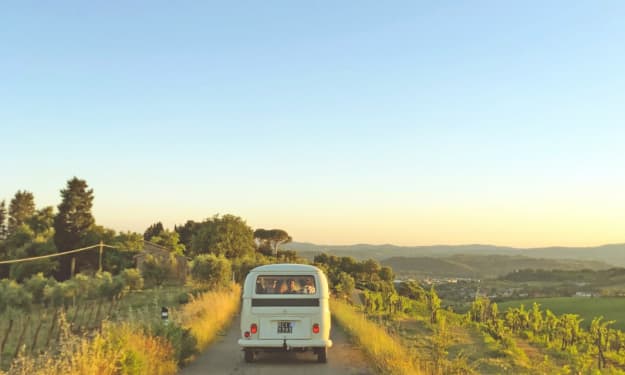
When I was seven years-old, my parents sold everything they owned and bought a sailboat. They wanted us to see the world, before it was gone. The ship was an O’Day 37 CC manufactured in 1978. O’Day was one of the most successful sailboat builders in the USA. Founded in 1958 by George O'Day, an American Olympic and World champion sailor. But the company went out of business in 1989, thirteen years before we bought the ship, who we’d later name Starshine III. It had a centre cockpit (CC), with a cabin at the back for my parents, the main cabin in which my brother slept on the couch and a v-birth at the tip of the ship where I rested with my little sister. It also had a wooden trim that my parents adored. It contrasted the beige-white plexiglass hull. Our deep blue canvas covers looked regal next to the wooden accent, which was purely decorative, and framed the shape of our vessel.
We lost the trim in the Caribbean, ripped un-cleanly off, when we were caught in the tail of a hurricane. I will never forget the clouds on that day. Pregnant, swollen black and low to the ocean’s surface. In its purple shadow, streaked with angular rain pushed hard by unforgiving winds, I saw only death. Mother bustled us into the main cabin, lifejackets on, laying on the floor together. My siblings and I.
At the time I didn’t know about Ethiopian Airlines Flight 961, hijacked nine years before the storm. twenty minutes into the flight, two men rushed to the cockpit. Intent on hijacking the plane to go to Australia. The place Mother was born.
This was before the towers fell.
The plane ran out of fuel, leaving the pilot with no other choice. He had to ditch into the ocean, as close to the shore as he could. One-hundred seventy-five souls on board. But the wing caught the water’s surface. It cartwheeled. Broke apart. After that the cabin flooded quickly. They must have been so scared. Panicking. Not wanting to drown, but drowning anyway.
Only fifty survive. The others, perishing after inflating their jackets inside the fuselage. Trapped by rising water. Caught up in their seats, bobbing on the roof. Knowing this now, the memory of the storm is worsened. Remembering my little body in that lifejacket, locked in a cabin my small fingers could hardly unthatch. Fear of what was and of what could have been surge around me in ragged waves. Burst against my hull. Bobbing in a ready-made tomb.
I was eleven when the storm overtook us. My sister ten and my brother only seven. My sister just had a birthday, in this very cabin. Celebrating with a butterfly cake, home made by Mother, decorated with pink twist candles and 100,000 sprinkles. I can’t remember how it tasted, though I assume it was sweet. What I do recall is the light cast by the candles. In the dark, it engulfed my sister’s face with an orange-yellow light. And when she blew out the candles, shadow fell upon her. And when Mother turned on the light, my sister was a different person.
I hold her hand. My brother cocooned between us. Parents screamed outside. Shouting commands over screeching wind and through howling rain. Holding fast to ropes, tightening their illusionary hold against the rage. Despite the terror, my brother decided to go back and to train for a life on the seas. As a ship’s captain.
But I would never see the waters the same way again. That day I learned a powerful lesson. A lesson which was staring to take shape in human consciousness in the Victorian era, as new disciplines and new discoveries changed the way that we saw nature, natural history and humanity’s place in the now, suddenly, immense world. I felt small and powerless in the grips of an unsympathetic nature. There was no rage, no mother of nature, no consciousness to delve out justice and mercy. It was endless chaos, and we were caught inside it.
The waves didn’t care that we were children. The winds were unfeeling toward our desire to live. The only thing between me and an austere death was a twenty-seven-year-old ship and two human parents who, despite their determination, were no match for what they fought.
If we had been caught in the body of the hurricane, I doubt we would have survived. We were lucky. And that’s when I realised that survival was about luck, chance, happenstance. My life could have ended that day if the winds had been just slightly different. Just a little to the left and we would have been doomed.
That was my mind when we visited the Old Hegg Turtle Sanctuary in Bequia, the largest in the chain of the southern Caribbean island nation called St. Vincent and the Grenadines. The mindset that life was impossibly cruel and we were incapable to fight against those forces.
I was wrong.
Although nature does not care, humans do. And we not only care about our own species, but for others as well.
Orton “Brother” King, founder of the sanctuary, had a fascination for sea turtles since his boyhood. Particularly for the hawksbill, a critically endangered species named for their narrow, pointed beak. Human impact, accidental capture in fishing nets and habitat loss are the main culprits for their looming extinction.
Not if Mr. King got the last word. He has spent his retirement monitoring beaches, checking nests, trying to protect mother turtles and eggs from poachers, collecting hatchlings, and taking them to the sanctuary so that they remain safe during the most vulnerable years of their life. All throughout the facility there were giant sea-water ponds filled with baby turtles. Rescued infants whom the volunteers wanted to provide their best chance at life.
In their first 12 years of operation, the sanctuary has released over 2000 three-year olds with their special mark (a hole drilled in the back end of the shell). I saw many turtles when I swan those oceans, but I never got close enough to check for any such mark. I was too afraid of being swallowed by their tooth-lined gullets.
In some of the pools were older turtles, injured by human actions. Twisted in nets, deformed shells from plastic waste, or sick from swallowing what should have never been dumped in our waters. On one wall, they had the shell of a leatherback sea turtle. Dermochelys coriacea, the lute turtle, leathery turtle, luth. It’s the largest living turtle species and the fourth heaviest reptile after our world’s three living dinosaurs, the crocodilians. The carapace isn’t made of bone, but skin and oily flesh. Which made the giant gash more horrifying to see. It was explained to me that the shell came from the biggest turtle they’d ever tried to save. He’d been run over by a boat and didn’t survive.
So, I asked the volunteer why they kept part of that turtle’s corpse, displayed like that, for everyone to see after it had died so tragically. Didn’t it deserve to be at rest, and not used for human entertainment.
They relied simply, so we never forget to always try.
It was not like the deer and buck heads in my Grandparents cabin, somewhere up north in the Canadian wilderness. A prize to be gawked at. This was a painful reminder of why they did the work.
The idea contained in those seven words was revolutionary. Those words rippled with me forever, becoming huge waves of change in my life. Humanity was the mother in the term mother nature. We were the ones responsible for the care of our world. To mother it. To support and nurture it as no other natural force could.
But we are not all good mothers. Some of use are selfish. We use and abuse those we should be protecting. We fill up our charge with all our waste, our greed and our self-gratification. We steal, cheat and bribe away the consequences of our failure. Always expecting nature to give, not matter what we take.
But nature is vast and endless, and it does not care about us. Should humanity continue on the path of the bad mother, we will soon experience how well our planet can adjust to a mass extinction event. Though we will not live to see the burst of evolution afterwards and the new life that will form in the gaps we left in the ecosystem.
My sister has no expectations for our future as a species. Radically child free and pessimistic, her early exposure to the filth and death humanity has wrought left her biter and hopeless. Her assertion is that there are too many humans on our planet to survive. Not too many in the sense that if we all used resources wisely and created better systems everyone would have what they needed to survive. Bu too many considering humanity’s tendency to horde, to take too much and too carelessly. To know the awful consequences of their actions, and to do it anyway.
I walk the path of the optimist. I want make a difference in the world, to work towards a brighter future in which good mothers prevail.
And when my child, due Christmas Eve, is born I want to teach them how to be a good mother to the earth. For the waves of my life to pass down to the next generation. Rippling the value of doing the right thing for the planet, rather than the easiest of most convenient for ourselves. They will inherit what the people of my parent’s and grandparent’s generations broke.
But broken things can be fixed. Like Kintsugi, the Japanese art of putting broken pottery pieces back together with gold, we cannot undo the damage done. Pretend like it never happened. Reset the world before we touched it. But if we embrace imperfections, embrace what we broke is truly broken and not ‘about to break,’ then we can craft an even stronger future. One more beautiful than the present. A work of art.
About the Creator
A.M. Mac Habee
A.M. Mac Habee is a non-binary, pansexual, disabled artist and author living and studying in the North East of England since 2017. They have a particular interest in multi-media, interdisciplinary and mixed forms that break with tradition.






Comments
There are no comments for this story
Be the first to respond and start the conversation.